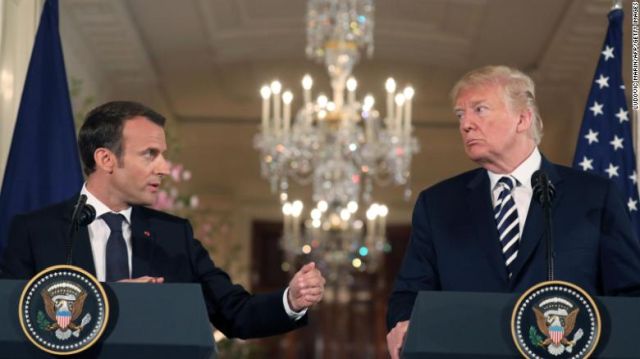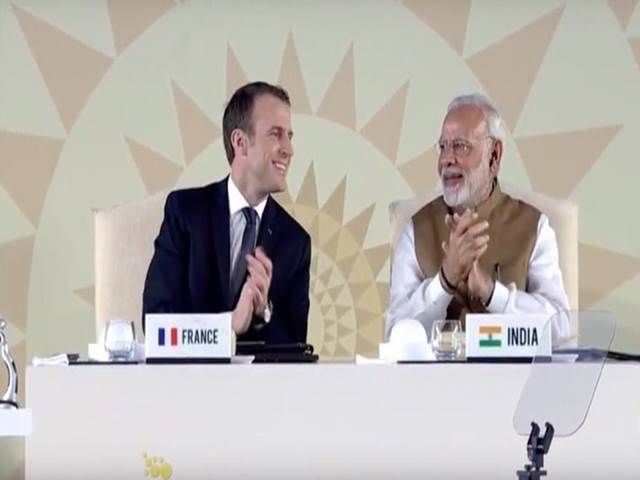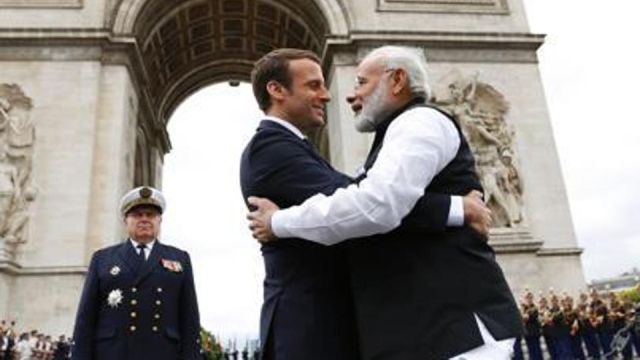
by admin | May 25, 2021 | World
 Paris : French President Emmanuel Macron and German Chancellor Angela Merkel showed their unity on the question of Brexit during a joint press conference here.
Paris : French President Emmanuel Macron and German Chancellor Angela Merkel showed their unity on the question of Brexit during a joint press conference here.
“The withdrawal agreement cannot be renegotiated,” declared the French President to members of the press at the Elysee Presidential Palace on Wednesday, a day after British Prime Minister Theresa May’s announcement of a possible delay of the UK’s departure from the European Union (EU), currently scheduled for March 29, Xinhua news agency reported.
“If the British need more time, we can consider a request for an extension,” he added, saying, “if it is justified.”
The moment has “come for the British to make choices,” insisted Macron, assured to have the support of Merkel.
During an address to the House of Commons Tuesday, May admitted for the first time the possibility of a delay of Brexit from March 29 until the end of June.
Beyond their displayed unity on Brexit, Macron and Merkel, both under pressure in their respective countries, must deal with numerous subjects which currently divide Paris and Berlin.
The German Chancellor also underlined to the gathered journalists the necessary “compromises” to be found.
During their working lunch, the two European leaders evoked “the principle subjects on the agenda for the March European Council (European industrial policy, reinforcement of the Euro zone, the fight against disinformation), Brexit, transatlantic relations and the international situation, as well as the defence relationship between France and Germany,” said the office of the French Presidency.
An update to the Franco-German treaty of friendship and cooperation, known as the Treaty of Aix-la-Chappelle, where it was signed in January, was also on the agenda for the meeting of the two leaders.
—IANS

by admin | May 25, 2021 | World
 Washington : A phone call between US President Donald Trump and his French counterpart Emmanuel Macron has been described as being “terrible” after the latter candidly criticised the former’s policies, a media report said.
Washington : A phone call between US President Donald Trump and his French counterpart Emmanuel Macron has been described as being “terrible” after the latter candidly criticised the former’s policies, a media report said.
“Just bad. It was terrible,” an informed source told CNN on Monday.
“Macron thought he would be able to speak his mind, based on the relationship. But Trump can’t handle being criticised like that.”
A White House statement said the call on May 31 with Macron was focused on trade and immigration.
“Both leaders discussed the migration problem in Libya, and timelines to solve it. President Trump underscored the need to rebalance trade with Europe,” the statement said.
The call with Macron came the same day the US announced a unilateral decision to slap steel and aluminium tariffs on American allies, including Mexico, Canada, and the European Union, CNN reported.
In a statement issued by the Elysee Palace ahead of the call, Macron said he “regrets the US decision to confirm tariffs in steel and aluminium.”
“This decision is not only illegal, it is a mistake on many points. It is a mistake because it responds to a worldwide unbalance that exists in the worst ways through fragmentations and economic nationalism,” it added.
Trump held a similar call with British Prime Minister Theresa May on Monday.
According to a Downing Street spokesperson, the two leaders discussed the tariffs as well as other matters.
—IANS

by admin | May 25, 2021 | World

Emmanuel Macron
Sydney : Visiting French President Emmanuel Macron has urged the Australian government to intensify its efforts in the fight against climate change and expressed his concern for the future of the countries in the Pacific.
“Numerous states in the Pacific are at direct risk of disappearing completely in only a few years if we do not take action,” Macron said at a dinner on Tuesday night at the Sydney Opera House, attended by the Australian Prime Minister Malcolm Turnbull and his wife as well as French politicians, businessmen and expatriates.
Macron stressed that the fight against climate change is an “absolute priority” and urged the Turnbull administration to show the “power of conviction” in confronting this global issue, despite the opposition they may face, reports Efe news.
“I am aware of the political and economic debate surrounding this problem in the country, and I respect it, but I believe that the real leaders are those who can respect existing interests and at the same time decide to participate in something broader and more strategic,” the president said.
“There is no Planet B,” Macron said, stressing that the fight against climate change is an “historic opportunity”.
Australia committed in the Paris Accord to reducing its emissions by 26 to 28 per cent from the 2005 levels by 2030, a target that Canberra says it will meet “without compromising economic growth and jobs”.
On Wednesday morning, Macron joined a special ceremony honouring Australian and French war veterans in Sydney.
It is expected that later Wednesday the two leaders will discuss the growing influence of China in the Pacific, where France maintains overseas territories, as well as the Iran nuclear deal.
Regarding trade, Macron and Turnbull are expected to discuss France’s resistance against a potential free trade agreement between Australia and the European Union (EU).
Although not on the agenda, it is expected that both leaders will also talk about the contract of French company Naval Group (DCNS) to build Australia’s new fleet of 12 submarines in the shipyards in the southern city of Adelaide.
—IANS

by admin | May 25, 2021 | Business, Business Summit, Corporate, Corporate Governance, Events, Investing, Large Enterprise
 New Delhi : French President Emmanuel Macron on Sunday announced an additional investment of 700 million euros for global solar energy generation by 2022 to reduce the use of fossil fuel and help combat climate change.
New Delhi : French President Emmanuel Macron on Sunday announced an additional investment of 700 million euros for global solar energy generation by 2022 to reduce the use of fossil fuel and help combat climate change.
Speaking at the launch of the first International Solar Alliance (ISA) summit, Macron called for “joint duties” towards a “planet that we are sharing” and took a dig at his US counterpart Donald Trump who pulled out of the 2015 Paris climate deal.
Macron said the summit to revolutionize the use of the clean energy by generating over 1,000 GW of solar power by 2030 was an outcome of the Paris accord even as “some left the floor” but others decided to act and keep acting.
The French President co-chaired the summit with with Prime Minister Narendra Modi at the Rashtrapati Bhavan that was also attended by the heads of 23 nations and 10 ministerial representatives.
Among those present were UN Secretary-General Antonio Guterres, Venezuelan President Nicolas Maduro and Bangladesh President Abdul Hamid.
“The French Development Agency will allocate additional 700 million euros to its commitment to solar energy by 2022,” Macron said.
This will take France’s total commitment to the solar alliance to 1,000 million euros.
“In 2015, we said we will allocate some 300 million euros to support (solar) projects in the member countries. This commitment by France was met a couple of months ago.”
Conceptualised by India, the solar alliance currently has 121 member countries. Out of those, 60 have signed the solar treaty and some 30 have ratified it.
The alliance of sun-rich countries was launched jointly by Modi and then French President Francois Hollande on the sidelines of the landmark 2015-Paris climate talks.
Without taking President Trump’s name, Macron at the Delhi summit said while some left the climate deal others stayed because they wish good for their children and grand children.
“All of us her have experienced global warming. Some of you here have lost your territories, economy and life of citizens.
“We should not forget that we only have one planet that we are sharing and for that there is no alternative. There is a joint destiny which means we also have some joint duties.
“Without the concept of climate justice there would have been no Paris Agreement.”
The French President pointed out that the alliance of the countries situated between the Tropics of Capricorn and Cancer account for three-fourth of the world’s population with a potential of 138 GW of solar power.
But, he said, only 50 to 60 per cent people living in the region have access to electricity.
Macron said the alliance needed to identify solar projects in every single member country.
“Each country with its solar energy potential will identify here their needs and how much finance they need. One hundred projects have already been listed,” he said, further calling the member states that investments in “these projects are very profitable”.
Under the ISA, 100 centres for excellence would train 10,000 technicians to achieve the target of 1,000 GW of solar energy that needs $1,000 billion, the President said.
He said the ISA should help small enterprises in small countries to help them mobilize projects and finances.
“But in order to reach $1,000 by 2030, to reach 1,000 GW solar energy, we need private investors. The alliance will provide a favourable framework,” he assured, adding that France, India, the World Bank and other member states were reviewing expensive existing guarantee mechanism.
The French President stressed on the affordable low cost solar solutions, saying “the alliance should be a place where technology can meet the expectations of people and country”.
He lauded India’s solar commitments that has 20 GW installed solar capacity – one of the fastest growing in the world. The country has increased its solar power capacity by about eight times over the past four years.
India’s wind power generation capacity is 32.8 GW. It aims to achieve 175 GW of clean energy by 2022, of which 100 GW is solar.
—IANS

by admin | May 25, 2021 | Opinions

Prime Minister Narendra Modi with French President Emmanuel Macron at the Arc de Triomphe, Paris, June 3, 2017.
By Ranvir Nayar,
Over the last seven decades, Indias relationship with France has been steady and stable, but perhaps a bit stale and out of energy — just like a long-married couple.
The election of Narendra Modi in 2014 as the Indian Prime Minister and the advent of Emmanuel Macron as the French President last year and the rapid economic reforms in both nations seem to have put a new energy in this relationship.
The two men have quite a few similarities. Both were elected to lead their respective nations with a surprisingly large majorities, demolishing the opposition parties, both used digital communication and social media networks to win the elections and continue to use them religiously even afterwards. They are also both seemingly in a big rush and have initiated a slew of economic reforms, including controversial ones and have so far managed to carry the day.
Both the leaders have also made their place on the global diplomatic platform and have infused a new dynamism in the international relations of their respective nations.
Thus when Prime Minister Modi and President Macron meet on Saturday in New Delhi, for the second time in less than nine months, there is widespread expectation they will infuse a new dynamism and energy in Indo-French ties.
It is a relationship that is multi-faceted, definitely time-tested and stable but in some aspects has also become stale. Over the decades, international affairs and geostrategic issues have become the bedrock of this relationship.
The bilateral relationship has received a big boost in the recent past due to the French prowess in certain domains that have become critical for India’s development. For instance, in the Smart City programme of the Indian government, which envisages development of 100 such cities, France is one of the key partners for India and can share a lot of knowhow, technology and processes to help this initiative. Currently, France has adopted three cities in India under this initiative.
France can also be a key partner in modernising and upgrading the creaking railway infrastructure across the country, improve the signaling and communications network as well as improve safety practices and standards and also help in introducing semi-high speed and high-speed railways in the country. The French national railway company, SNCF, is already conducting a feasibility study to upgrade the Delhi-Chandigarh route to a semi high-speed one.
The two countries are also collaborating in the shipping industry with French ports, notably Marseille entering into a ‘sister port’ agreement with Mumbai. French companies are also present in the large road construction projects in India. In waste management and water supplies, French industry leaders such as Veolia and Suez have been bagging contracts with Indian municipalities for some years now.
The list is seemingly endless. In the area of high technology, such as smart cards and avionics, as well as biotechnology, artificial intelligence, augmented reality and machine learning also there is a lot of scope.
Despite the very long list of potential business collaboration between the two nations, this is by far the weakest link in Indo-French ties and has been the case for decades. The trade has remained stubbornly stuck around 9 billion euros for close to a decade. Indo-German trade, by contrast, is close to 25 billion euros and India-UK around 27 billion euros. In fact, even though France is the third largest European economy, it ranks ninth in the terms of EU member nations’ trade with India, behind much smaller nations such as the Netherlands, Italy and even Belgium.
The trade is inordinately dependent on the Indian government or companies placing large orders for high value items such as defence equipment or civil aircraft. In the absence of these large deals, trade suffers and remains stagnant.
Even though there are nearly 300 French companies in India, an overwhelming share are the largest, with small and medium enterprises — the backbone of the French economy — almost entirely absent from the scene. This is in sharp contrast with Germany, whose SMEs have been fairly aggressive in India and are present in various domains. The story of Indian SMEs in France is no different. Besides exporters, mainly of commodities, some engineering products and textiles, the number of Indian SMEs engaged with France can be counted on the fingertips.
It is not for lack of trying, though. The French and Indian governments have long been trying to get SMEs to start exploring market opportunities. Way back in 2006, the then economy minister of France and the current head of the International Monetary Fund, Christine Lagarde led over 500 French SMEs for a roadshow across various Indian cities. A number of other delegations of SMEs have been travelling to both the countries, but with very limited impact.
The biggest hurdle for the SMEs is that they lack market knowledge, adequate exposure and the financial muscle to explore new markets, especially ones reputed to be difficult — something shared by India and France. These factors make them highly risk averse.
To do some handholding and encourage French SMEs to start working with India, the Indian government has launched a concerted attempt — Access to India Initiative, which would identify relevant French SMEs, especially in manufacturing domain and assist them in all actions such as market research, creation of company, recruitment etc.
Such measures should encourage some French SMEs to take the plunge in India and if they succeed, it could lead others to follow.
A lot of expectations are riding on the Modi-Macron encounter and this visit has the potential to become the game changer in the bilateral relationship. However, overcoming the hurdles is far from easy and the two leaders would have to use all the tricks in their bags to make France and India natural business partners as well.
(Paris-based Ranvir S. Nayar is managing director of the Media India Group. He can be contacted at r.nayar@mediaindia.eu)
—IANS

 Paris : French President Emmanuel Macron and German Chancellor Angela Merkel showed their unity on the question of Brexit during a joint press conference here.
Paris : French President Emmanuel Macron and German Chancellor Angela Merkel showed their unity on the question of Brexit during a joint press conference here.



